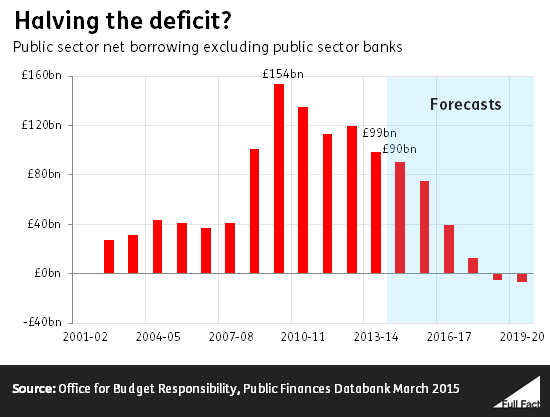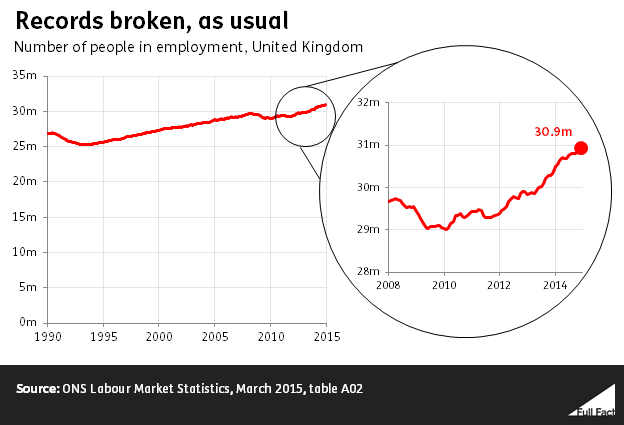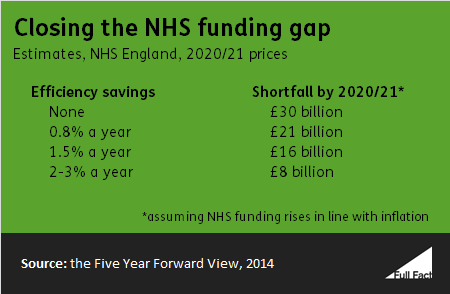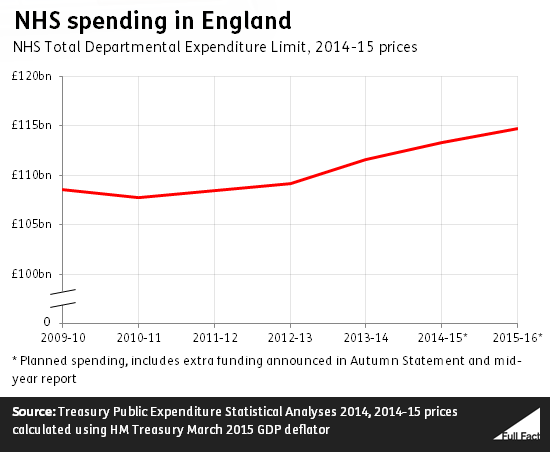Key claims from the Conservatives' manifesto launch
The Conservatives have published their election manifesto. We've taken a look at their claims on the economy, jobs, taxes, and the NHS, taken from David Cameron's speech as the manifesto was unveiled, and from the manifesto itself.
Deficit down and will fall further
"We will be back in the black, but only if the Conservatives are back in government"—Cameron's speech
"We have halved our deficit as a share of our economy"—manifesto, page 5
"In 2018-19, we are set to move into surplus"—manifesto, page 9
- The budget deficit has been halved as a proportion of the size of the economy (GDP), from its peak in 2009-10.
- In cash terms, it's fallen by 41% over the same period.
- Back in 2010, forecasts indicated that the structural deficit would be eliminated by 2014-15 (excluding investment spending). Growth was weaker than expected, and tax revenues weren't as high as was hoped.
- Current forecasts for this measure suggest we're on course for a surplus by 2017-18.
- There are a number of alternative ways to measure the deficit.
Join 72,953 people who trust us to check the facts
Sign up to get weekly updates on politics, immigration, health and more.
Subscribe to weekly email newsletters from Full Fact for updates on politics, immigration, health and more. Our fact checks are free to read but not to produce, so you will also get occasional emails about fundraising and other ways you can help. You can unsubscribe at any time. For more information about how we use your data see our Privacy Policy.
Jobs creation
"1,000 jobs created for every day of the Parliament since 2010"—manifesto, page 8
- There are a record number of people in work, at just under 31 million at the end of last year.
- But there are also a record number of people. The employment rate is a more useful measure in this context and that shows we're at or near-record levels, depending on which measure you choose.
- Compared to the three months before the last election, employment is up by 1.9 million, that's roughly 1,000 jobs a day. Of those there are:
- 1.3 million more employees and 600,000 more people self-employed.
- 1.4 million more full-time workers and 500,000 more part-time workers.
- 400,000 fewer public sector employees, and 2.3 million more private sector employees.
- It's worth bearing in mind that around 4% of workers have two jobs.
Paying less in tax
"People being able to earn £10,600 before they start paying tax. 3 million of the poorest people in our country taken out of tax"—Cameron's speech
"3 million of the lowest paid are paying no Income Tax at all"—manifesto, page 25
- The personal income tax allowance has risen to £10,600 following the 2015 Budget.
- The increased tax allowance is worth £825 to a typical taxpayer, and has taken roughly 3 million people out of income tax, according to HMRC analysis.
More money for the NHS
"There is £8 billion more a year for our NHS"—Cameron's speech
"[we will] spend at least an additional £8 billion by 2020 over and above inflation to fund and support the NHS's own action plan"—manifesto, page 37
- This NHS funding pledge has been made previously. If the NHS in England makes no efficiency savings and funding rises only with inflation, the estimated funding gap will be at £30 billion by 2020/21.
- If it makes savings of 2-3% that gap falls to £8 billion.
- Some have questioned how likely it is for this more optimistic savings target to be achieved.
- If the NHS doesn't make £22 billion in savings then the next government will need to pledge more than £8 billion in order to close the funding gap, or the quality or quantity of services will be at risk.
"We have increased the NHS budget above inflation every year"—manifesto, page 38
- NHS England spending rose in each year from 2010/11 to 2014/15.
- Over the whole period it went up by £5.5 billion from £108 billion to £113 billion. These are all in 2014/15 prices.
- Population growth outpaced NHS spending between 2010/11 and 2012/13, so spending per person fell by 0.4%.
- Costs are also rising. The number of over-65s will be up by 10.7% over this parliament, and spending on retired households is nearly double that on non-retired households.
Updated: 15 April 2015 — We added quotes from the Conservatives' manifesto to the existing quotes from David Cameron's speech



